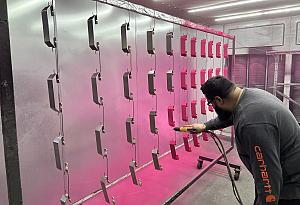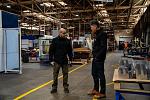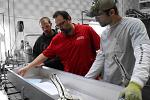- FMA
- The Fabricator
- FABTECH
- Canadian Metalworking
Categories
- Additive Manufacturing
- Aluminum Welding
- Arc Welding
- Assembly and Joining
- Automation and Robotics
- Bending and Forming
- Consumables
- Cutting and Weld Prep
- Electric Vehicles
- En Español
- Finishing
- Hydroforming
- Laser Cutting
- Laser Welding
- Machining
- Manufacturing Software
- Materials Handling
- Metals/Materials
- Oxyfuel Cutting
- Plasma Cutting
- Power Tools
- Punching and Other Holemaking
- Roll Forming
- Safety
- Sawing
- Shearing
- Shop Management
- Testing and Measuring
- Tube and Pipe Fabrication
- Tube and Pipe Production
- Waterjet Cutting
Industry Directory
Webcasts
Podcasts
FAB 40
Advertise
Subscribe
Account Login
Search
Advice for Ken about his welding career
- By Vicki Bell
- January 25, 2012
Perhaps no one is more qualified to answer Ken's questions than readers of the "Welding Wire," e-newsletter. We put the questions in the January issue, and here's what some of the readers had to say.
Carl said, "When I got out of the Army in 1968, my Dad thought I was going to be a bricklayer like him. I didn't; I went to school to become a welder. After completing welding school in 1970, I got my first welding job. From 1970 to 1983, I worked at just about all kinds of welding. In 1983 the construction job I was on ran out. I came to work for the company I'm with and have been with them ever since. I TIG weld turbine aircraft engine parts.
"No matter how many certifications you have under your belt, you will have to test at any job. To comply with the Federal Aviation Agency, I have to test every year, in six metal groups—two tests per group. I personally feel that experience is better than a pocket full of degrees."
Melissa offered the following advice: "I would say if you’re going into teaching, then a degree is the way to go. If you want to travel and be able to use your skills everywhere you go, then get the certifications, as many as you can get in all positions and all processes."
Paul said, "My advice to Ken is go for it! You can most certainly enjoy a challenging and rewarding career in the welding trade. You can also take many different routes in the trade. You can inspect, instruct, be an engineer and metallurgist, and the welding trade crosses most other trades as well, for example, millwright.
"As you move into a career in welding I will tell you this … acquire as much knowledge and theory you can. This will put you in a much higher place in the trade and will allow you to do much more. I was a welding instructor for more than five years to people from many different walks of life—young and old, experienced and nonexperienced—and I told everyone I taught the same thing. Take extra courses, read more books, ask more questions; this will put you above the rest.
"You could just learn to weld and be happy there—what you would call a 'rod burner' or a 'MIG monkey'—and that is okay, if that is what you want. I highly advise you to acquire as much knowledge and theory of welding you can, and I can tell you it will put on the top of the list when you look for work. So, go for it, Ken, and most of all, enjoy it!"
Jeff said, "With more than 30 years in the welding and fabrication industry and a degree as well, I offer the following: Get the education in any case. That will open more doors for you in the future.
"To become a top- notch welder/fitter/fabricator, you should understand theory, blueprint reading, basic metallurgy, etc. (A few basic business classes wouldn’t hurt either.) While I'm not saying that one could not be a good welder/fitter without education, I truly believe that the more you understand your chosen profession, the more opportunity you will have to really make a difference.
"Getting an education does not necessarily mean formal schooling. Many welders are self-educated using the vast selection of books and the Internet. About the Internet—there really is a lot of misinformation out there too. Be careful to select information from credible sources like the major welding product manufacturers, at least at first, so you can separate out the bs found on many Web sites.
"As far as certifications? They are necessary in the industry, period. If you are going to weld on a project that requires them, you'll have to certify to the project-specified code, whether you have a degree or not.
"A very common and possibly dangerous misconception of 'certified' welders is that they are qualified for whatever comes into the shop. Don't be lead down that path. Certifications are very specific regarding the process and material to be used. Most changes require recertification, and besides, most companies you might work for are going to require their own welding test. Talk to your instructor or other knowledgeable person before you waste your money taking a welding test that may be of absolutely no use. Good luck!"
There you have it, Ken—straight talk from seasoned welders. To echo Paul, go for and enjoy it! And keep us posted on your progress.
Follow fabcomlady on Twitter.
Become a fan of The Fabricator® on Facebook.
subscribe now

The Fabricator is North America's leading magazine for the metal forming and fabricating industry. The magazine delivers the news, technical articles, and case histories that enable fabricators to do their jobs more efficiently. The Fabricator has served the industry since 1970.
start your free subscriptionAbout the Author

Vicki Bell
2135 Point Blvd
Elgin, IL 60123
815-227-8209
- Stay connected from anywhere

Easily access valuable industry resources now with full access to the digital edition of The Fabricator.

Easily access valuable industry resources now with full access to the digital edition of The Welder.

Easily access valuable industry resources now with full access to the digital edition of The Tube and Pipe Journal.
- Podcasting
- Podcast:
- The Fabricator Podcast
- Published:
- 04/16/2024
- Running Time:
- 63:29
In this episode of The Fabricator Podcast, Caleb Chamberlain, co-founder and CEO of OSH Cut, discusses his company’s...
- Industry Events
16th Annual Safety Conference
- April 30 - May 1, 2024
- Elgin,
Pipe and Tube Conference
- May 21 - 22, 2024
- Omaha, NE
World-Class Roll Forming Workshop
- June 5 - 6, 2024
- Louisville, KY
Advanced Laser Application Workshop
- June 25 - 27, 2024
- Novi, MI































